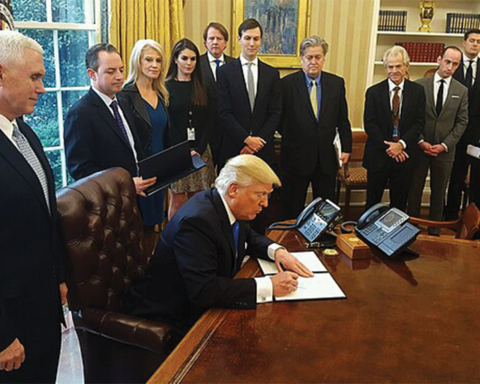By Dominic Gismondi, Staff Writer
In 2019, the Trump administration announced that the United States was energy independent for the first time since 1957. That is to say, the US no longer needs to import foreign-produced oil to meet its energy needs. This was in no small part due to the promotion of domestic oil companies, as well as strides in nuclear power and natural gas.
Energy independence was a mere dream in 2013, when the US was 36% reliant on imported oil. This oil, priced at over $100 a barrel, drove gas prices up to an average of $3.53. Now, with the increase in US production, the average price of gas dropped to $2.60, while also creating thousands of jobs for US citizens.
These improvements to the energy industry can be directly related to the Trump administration and its policies regarding energy. Promotions of natural gas, which burns far cleaner than other fossil fuels, have lowered US carbon emissions by 2.8%. This is the lowest it has been since 1992, and the lowest it has been per capita since 1950. Emissions were also lowered by innovators in the private sector, who created new harvesting methods, cut down on vehicle emissions, and increased efficiency in power plants, including through renewable methods.
The benefits of energy independence also go beyond lower prices and cleaner skies. In the final weeks before the 2020 Presidential Elections, the Trump administration has taken great strides in improving the diplomatic situation of the Middle East. In only three months, the United States has helped create peace deals between Israel and three nations, the United Arab Emirates (UAE), Bahrain, and Sudan. These deals, nicknamed the Abraham Accords, are only the beginning of a number of historic diplomatic deals, the likes of which have not been seen in decades. Israel, a strong ally of the United States, has struggled to gain diplomatic recognition from its neighbors. The Abraham Accords extend this long-sought recognition to the nation, which normalizes diplomatic, commercial, security, and other relations between the countries. This is especially lucrative, as Israel offers a diverse and prosperous economy to trade with the other countries, who are mostly single-export nations.
The reason these peace deals could be struck was in large part due to the United States’ newfound energy independence. Previously, the US was importing oil from these countries, and thus was at a diplomatic disadvantage. Now, unable to sell to their largest buyer, the governments of these countries are realizing that the age of their oil export economy is coming to an end, and that they need to develop a strong security coalition against aggressors, particularly Iran. Thus, entering into a peace deal with the most advanced and diversified economy of the Middle East while simultaneously improving diplomatic relations with the United States becomes a powerful strategic option.
With three deals already struck, it is expected that many more will follow as other Middle Eastern nations pursue this new strategy. Most prominently, Saudi Arabia is expected to strike a similar deal in the near future. Bahrain would never have pursued this deal without prior authorization from the House of Saud, the ruling royal family of Saudi Arabia.
The ancillary benefits of the Trump administration’s energy independence policy are now becoming more and more clear. His actions have paved the way to the end of conflict in one of the most contested regions in the world. Additionally, this peace was accomplished by expanding the US economy and creating jobs, a feat once thought impossible. None of this would have occurred were it not for US energy independence, which should absolutely be preserved and expanded going into the future.
gismondm19@bonaventure.edu








